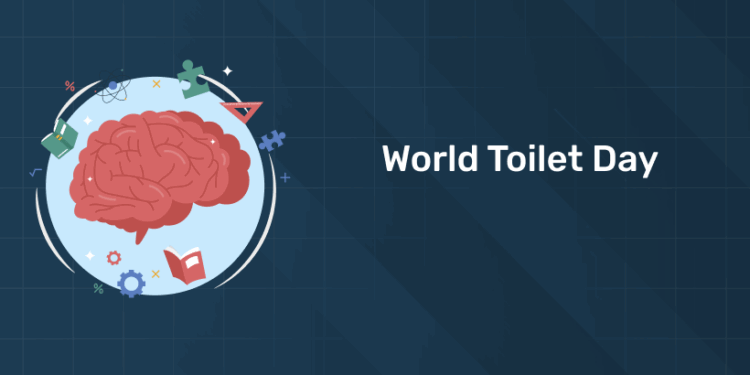Table of Contents
Many people in the world are living without proper sanitation facilities and it is one of the main topics of concern due to the very bad and devastating health conditions that arise due to unhealthy sanitation activities. Given below we will be sharing some of the most important specifications related to World Toilet Day 2025 and all of the activities that you can take in order to encourage proper sanitation activities in your local area and help the world to be more sustainable for future generations.
World Toilet Day 2025 Date – November 19
In this article readers can get a glimpse on
- World Toilet Day Quotes and Activities
- World Toilet Day Theme 2025
- World Toilet Day Quiz
World Toilet Day
1: Who was the first woman President of India?
The United Nations has created International days and weeks so that the public can be educated on the issues related to the condition and global problems. These International days are created in order to create awareness related to the issues that many people in the world are going through. World Toilet Day was created because around 3.6 billion people in the world have no access to proper toilets and this day will help celebrate the existing proper sanitation facilities. This day is also created in order to create awareness related to the sanitation facilities available to around 3.6 billion people living in the world.
Free UPSKILLING Courses!
Take your first step toward mastering in-demand skills, acing interviews, and securing top-tier jobs with Entri's free upskilling courses.
Start Learning!World Toilet Day in India
World Toilet Day will be observed on 19th November and this will also be celebrated in India through a week-long awareness campaign on the Safai Mitra Suraksha challenge which will be starting from Sunday that is 14th November 2022. This campaign is launched by the Ministry of Housing and Urban Development in India and it will create a great impact on the sanitation problems present in India and this week will definitely help in providing proper sanitation opportunities for the people who are not able to get access to them.
World Toilet Day Theme 2025
World Toilet Day, observed annually on November 19th, is an official United Nations observance coordinated by UN-Water to inspire action to tackle the global sanitation crisis. This year’s campaign highlights the enduring and essential nature of sanitation in a rapidly changing world.
The Central Crisis
Access to safe sanitation is a human right, yet 3.4 billion people—nearly half the global population—still live without safely managed sanitation services. Furthermore, hundreds of millions still practice open defecation, leading to the spread of deadly diseases like cholera and dysentery.
The 2025 Campaign Focus
The theme “We’ll Always Need the Toilet” calls for urgent and sustained investment to protect and expand access to sanitation in the face of growing pressures:
- Ageing Infrastructure: In many parts of the world, sanitation systems are old, underfunded, and failing to meet the needs of growing populations.
- Climate Change Threat: Extreme weather events like floods and droughts can destroy or disrupt sanitation services, spreading disease and displacing communities. Poorly managed sanitation also contributes to global warming through methane emissions.
- Lagging Investment: Progress towards Sustainable Development Goal 6 (Clean Water and Sanitation for all by 2030) is severely off track, requiring an average six-fold increase in the rate of progress globally.
World Toilet Day Previous Themes
World Toilet Day is an official United Nations observance held annually on November 19th. The day’s campaign is coordinated by UN-Water and focuses on tackling the global sanitation crisis and achieving Sustainable Development Goal (SDG) 6, which promises sanitation for all by 2030.
Here are the official themes and primary campaign slogans from 2014 to 2024:
- 2024: Toilets – A Place for Peace
- Focus: Highlights that sanitation is often under threat from conflict, climate change, disasters, and neglect, and emphasizes that safe sanitation is fundamental to peace and security.
- 2023: Accelerating Change
- Focus: Encouraged individuals and communities to take small actions (symbolized by a hummingbird) to contribute to the large-scale change needed to meet SDG 6 by 2030.
- 2022: Making the invisible visible
- Focus: Explored the impact of the sanitation crisis on groundwater—a vital water source—emphasizing that safely managed sanitation protects this hidden resource.
- 2021: Valuing Toilets
- Focus: Highlighted that sanitation systems are often non-existent or neglected and stressed the need to value and invest in sanitation infrastructure.
- 2020: Sustainable Sanitation and Climate Change
- Focus: Examined the link between sanitation, climate change, and health, noting that both flood and drought events can severely damage sanitation systems and spread disease.
- 2019: Leaving No One Behind
- Focus: A core promise of the Sustainable Development Goals, drawing attention to the billions of people—especially women, girls, and marginalized groups—still living without safe sanitation.
- 2018: When Nature Calls (Also used: Toilets and Nature)
- Focus: Encouraged nature-based solutions to wastewater management and highlighted the environmental consequences of dumping untreated human waste.
- 2017: Wastewater
- Focus: Emphasized the journey of water after it leaves the toilet, stressing the need for better systems to collect, treat, and safely reuse wastewater.
- 2016: Toilets and Jobs
- Focus: Drew attention to the role of sanitation in creating a strong economy and protecting workers’ health, especially sanitation workers who provide essential services.
- 2015: Toilets and Nutrition
- Focus: Explored the crucial link between proper sanitation and good nutrition, as poor sanitation leads to diarrheal diseases that prevent the body from absorbing nutrients.
- 2014: Equality and Dignity
- Focus: Highlighted that lack of sanitation disproportionately affects women and girls by compromising their safety, dignity, and educational opportunities.
Key Action Points: Future-Ready Sanitation
The 2025 campaign emphasizes the urgent need to invest in “future-ready” sanitation systems that are:
- Accessible to All: Ensuring toilets are available and usable for everyone, including women, girls, the elderly, and people with disabilities.
- Resilient to Shocks: Building infrastructure that can withstand floods, droughts, and other climate hazards.
- Minimizing Emissions: Adopting systems that safely process human waste while minimizing greenhouse gas output.
- Supported by Strong Systems: Relying on sustained investment and effective management to ensure long-term functionality.
Free UPSKILLING Courses!
Take your first step toward mastering in-demand skills, acing interviews, and securing top-tier jobs with Entri's free upskilling courses.
Start Learning!World Toilet Day Quotes
In order to create awareness among the local people of rural areas and help them to live a life that is equipped with the proper sanitation activities, all of us must do our bit. Given below we are sharing some interesting World Toilet Day quotes that you can share on your social media to wish your friends a very happy World Toilet Day.
- Some people read while on the toilet… others learn to read because of a toilet.
- If you play horseshoes with a toilet seat. You might be a redneck.
- As the world toilet day approaches we should keep it in mind to tell those people who are not aware of the various dangers of an ill-maintained sewage system.
- World Toilet Day brings to light the unfortunate ways many people in rural regions live.
- World Toilet Day is all about teaching people how to manage their wastes so that they remain healthy and not get infected by diseases.
- Without proper sanitation systems, there are a million ways in which diseases can spread and the motto of world toilet day is to discuss the ways in which these diseases can be dealt with.
- 2.5 billion people in the world do not have access to a toilet.
World Toilet Day Activities 2025
For World Toilet Day 2025, the United Nations’ global campaign, coordinated by UN-Water, is centered around the theme: “We’ll Always Need the Toilet”.
The 2025 campaign aims to call for urgent action to protect and expand access to sanitation in the face of mounting challenges like ageing infrastructure, rising demand, low investment, and the severe impacts of climate change (such as floods, droughts, and rising sea levels which threaten sanitation systems).
The core message is that sanitation is a human right and an indispensable foundation for health, environmental protection, and dignity. With 3.4 billion people still living without safely managed sanitation, this year’s focus is on the critical need to invest in “future-ready” sanitation that is:
- Accessible to all.
- Resilient to climate shocks.
- Minimizing greenhouse gas emissions.
- Supported by strong systems and sustained investment.
You can take part in this vital campaign for the betterment of society and help achieve Sustainable Development Goal 6 (Water and sanitation for all by 2030) by:
- Sharing Awareness: Join the global social media conversation using the official hashtag #WorldToiletDay.
- Educating Others: Organize or participate in educational events, workshops, or community discussions to highlight the importance of sanitation and hygiene.
- Advocating for Change: Encourage local and national governments to prioritize and invest in resilient sanitation infrastructure.
- Supporting Projects: Contribute to organizations that provide access to clean and safe toilets in underserved communities.
World Toilet Day Messages
It is important to take part in the campaign created by the UN in order to create awareness related to the sanitation problems available all around the world. Given below we are sharing some messages and greetings that you can share on your social media to wish your friends a very healthy World Toilet Day.
- “There are still many countries in the world that cannot provide proper sanitation to its citizens.”
- “This day reminds us of the importance of sanitation and hygiene in our lives.”
- “There are many ways in which we can improve the sanitation systems in our localities and we should focus on that “
- “As the world toilet day approaches we should keep it in mind to tell those people who are not aware of the various dangers of an ill-maintained sewage system.”
- “Human wastes have the potential to cause life-threatening diseases.”
- “It is important to dispose of human wastes properly so that no diseases are borne out of it.”
- “Composting human wastes is of utmost importance because wastes cause a lot of complications“
- “The world toilet day reminds us of the importance to have a healthy and hygienic sanitation system.”
- “The sanitation system is a major concern of many countries as it is not easy to deal with the wastes of so many people.”
World Toilet Day Quiz 2025
A) World Toilet Organization
B) World Health Organization
C) UNICEF
3. In which year did the United Nations officially recognize World Toilet Day?
A) 2010
B) 2013
C) 2015
B) Jack Sim
C) Bill Gates
5. Approximately how many people worldwide lack access to safe toilets?
A) 2 billion
B) 3.5 billion
C) 4 billion
A) Goal 5
B) Goal 6
C) Goal 7
A) Europe
B) South Asia
C) North America
A) 40%
B) 60%
C) 80%
A) UN-Water
B) UNDP
C) WHO
Want More Engaging Questions?
Download our FREE PDF packed with insightful quiz questions to test your knowledge!
🔽 Click below to get your free copy now! 🔽
World Toilet Day Quiz 2025 PDF
World Toilet Day reminds the world that sanitation is a basic human right, not a privilege. It highlights the ongoing global struggle faced by billions who still lack safe toilets. Access to proper sanitation prevents diseases, promotes dignity, and ensures environmental protection. The observance encourages individuals, communities, and governments to prioritize hygiene and invest in sustainable sanitation solutions.
By spreading awareness through campaigns, quizzes, and educational activities, World Toilet Day strengthens global efforts toward achieving universal sanitation. It calls on everyone to support the Sustainable Development Goal of clean water and sanitation for all. Small actions, like promoting hygiene education or supporting toilet construction initiatives, can make a big difference. Together, we can create a cleaner, healthier, and more equitable world.
Free UPSKILLING Courses!
Take your first step toward mastering in-demand skills, acing interviews, and securing top-tier jobs with Entri's free upskilling courses.
Start Learning!Frequently Asked Questions
What is World Toilet Day?
World Toilet Day is a United Nations observance held on November 19 each year. It raises awareness about the global sanitation crisis affecting billions of people. The day focuses on ensuring access to safe toilets and hygiene for all. It emphasizes the importance of proper sanitation for health, safety, and dignity. The event also encourages collective efforts to achieve Sustainable Development Goal 6: Clean Water and Sanitation.
Why is World Toilet Day important?
World Toilet Day is vital because nearly half the world’s population lacks safe sanitation. Poor sanitation causes diseases like cholera, diarrhea, and dysentery. It also affects education, especially for girls, and limits economic productivity. By highlighting these issues, the day promotes investment in sanitation infrastructure. Its purpose is to ensure a cleaner, healthier, and more dignified world for everyone.
Who founded World Toilet Day?
World Toilet Day was founded by Jack Sim, a social entrepreneur from Singapore. He established the World Toilet Organization in 2001 to address sanitation challenges. The initiative gained global attention for promoting hygiene and dignity through better toilets. In 2013, the United Nations officially recognized November 19 as World Toilet Day. Jack Sim’s work inspired worldwide efforts to improve sanitation systems.
Which organization oversees World Toilet Day activities globally?
World Toilet Day is coordinated by UN-Water, a United Nations body focusing on water and sanitation issues. It leads global campaigns, partnerships, and educational initiatives related to sanitation. UN-Water works with governments, NGOs, and communities to promote better hygiene. It provides resources and reports to raise awareness about sanitation progress. The organization ensures the day aligns with Sustainable Development Goal 6 objectives.
How many people still lack access to safe toilets worldwide?
Approximately 3.5 billion people do not have access to safe toilets. Many are forced to use unsafe or shared facilities, increasing health risks. Around 419 million people still practice open defecation, especially in rural areas. This lack of sanitation causes water contamination and disease outbreaks. World Toilet Day aims to end open defecation and ensure universal access to hygiene facilities.
What health problems are linked to poor sanitation?
Poor sanitation leads to the spread of deadly diseases like cholera, diarrhea, and typhoid. Contaminated water and food cause severe infections, especially in children. It contributes to malnutrition and stunted growth in developing countries. Women and children are also vulnerable to infections due to inadequate hygiene. Improving sanitation is one of the most effective ways to prevent these illnesses.
How does poor sanitation affect education and gender equality?
Lack of toilets in schools forces many girls to miss classes, especially during menstruation. This leads to lower attendance and higher dropout rates. In many areas, girls and women travel long distances for sanitation, risking their safety. Access to safe toilets promotes dignity, privacy, and equal opportunity in education. Thus, sanitation improvements directly support gender equality and empowerment.
What is the link between sanitation and the environment?
Poor sanitation contaminates rivers, lakes, and groundwater with untreated waste. It affects ecosystems and reduces the availability of clean water. Pollution from open defecation and improper waste disposal harms marine life. Sustainable sanitation systems can help recycle waste and conserve water. World Toilet Day promotes eco-friendly solutions to protect both people and the planet.
What can individuals do to support World Toilet Day?
Individuals can spread awareness about the importance of sanitation and hygiene. They can participate in local clean-up drives and hygiene education programs. Supporting organizations that build toilets in rural and poor communities also helps. People can share facts on social media to encourage public involvement. Every small action contributes to achieving global sanitation goals.
How does World Toilet Day contribute to global development goals?
World Toilet Day directly supports Sustainable Development Goal 6 on clean water and sanitation. It also contributes to goals related to health, education, and gender equality. By addressing sanitation challenges, it helps reduce poverty and inequality. The day unites governments, NGOs, and citizens to create lasting solutions. Ultimately, it promotes global well-being through safe sanitation for all.












